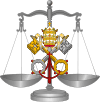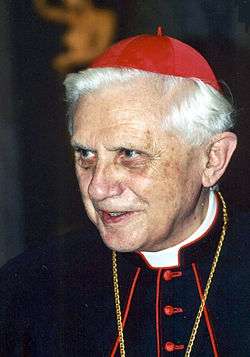Peritus
Peritus (Latin for "expert") is the title given to Roman Catholic theologians attending an ecumenical council to give advice. At the Second Vatican Council, some periti (the plural form) accompanied individual bishops or groups of bishops from various countries. Others were formally appointed as advisers to the whole council.
 |
| Part of a series on the |
| Canon law of the Catholic Church |
|---|
|
Jus antiquum (c. 33-1140)
Jus novum (c. 1140-1563) Jus novissimum (c. 1563-1918) Jus codicis (1918-present) Other |
|
Sacraments
Sacred places
Sacred times |
|
|
Supreme authority, particular churches, and canonical structures Supreme authority of the Church
Supra-diocesan/eparchal structures
|
|
|
Temporal goods (property) |
|
Canonical documents |
|
Procedural law Pars statica (tribunals & ministers/parties)
Pars dynamica (trial procedure)
Election of the Roman Pontiff |
|
Legal practice and scholarship
Academic degrees Journals and Professional Societies Faculties of canon law
Canonists |
|
|
| Part of a series on the |
| Theology of Pope Benedict XVI |
|---|
 |
|
Movements
|
|
At the First Vatican Council, John Henry Newman refused an invitation to be a peritus.
Joseph Ratzinger who became Pope Benedict XVI served as peritus to Cardinal Josef Frings, Archbishop of Cologne, Germany, while Hans Küng was a peritus for the Second Vatican Council, rather than for an individual bishop.
The German theologian Karl Rahner served as peritus to Cardinal Franz König of Vienna.
Cardinal Yves Congar served as a consultant to the council upon the invitation of Pope John XXIII, but was hired as personal and expert theologian (peritus) at the council to Bishop Jean-Julien Weber of Strasbourg which allowed him to attend all the general sessions and to take participate in discussions of any commission to which he was invited to.[1]
The periti of Vatican II,[2] although their official status designates them as at the service of the council, were most often first of all at the service of the currents which clashed at the council, either on the side of a reform of the church (acceptance of religious freedom, revision of church–state relations, reassessment of relations with other religions), either on the side of the continuation of a clash of Catholicism with the other institutions and currents of society, in the wake of the councils of Trent and Vatican I (especially for the experts close to Coetus Internationalis Patrum[3]).
As for the US, there were 86 periti altogether during the four sessions of the council.[4]
References
- Woodrow, Alain (26 October 2002). "Diary of an insider". The Tablet. Archived from the original on February 1, 2013. Retrieved 4 November 2013.
- Weiser, François. "Les experts au concile Vatican II : socio-histoire d'un affrontement culturel à l'intérieur du champ religieux catholique". Retrieved 3 October 2018.
- Roy-Lysencourt, Philippe. "Le Coetus internationalis Patrum, un groupe d'opposants au sein du Concile Vatican II". Retrieved 3 October 2018.
- Weiser, François. "The Periti of the United States and the Second Vatican Council: Prosopography of a Group of Theologians". Retrieved 3 October 2018.